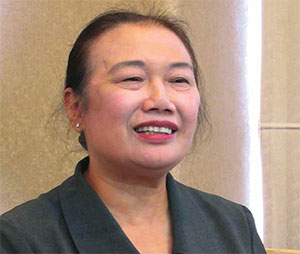Directive orders fewer inspections
| RELATED CONTENTS: | |
| Government to focus on reducing costs of doing business | |
| PM kicks off private sector talks | |
| Business community tables proposals for PM | |
 |
| Nguyen Thi Cuc, chairman of the Vietnam Tax Consultants' Association |
Resolution 35/NQ-CP dated May 16, 2016 on supporting and developing companies by 2020 stipulated that government agencies are not allowed to inspect and examine companies more than once a year. However, as of now, companies continue complaining about being inspected and examined too often. Does this mean that government agencies widely disregard this resolution?
If the government wants to ensure that companies are inspected at most once a year, the Government Inspectorate (GI) should work with the State Audit Office of Vietnam (SAOV) to review all legal documents on inspection, especially sector-specific inspections, examinations, and auditing, in order to combine them into one and ensure that the different agencies recognise each other’s inspection results. The government agencies should also publicly announce their inspection, examination, and audit plans so that they will not overlap. They should not hold inspections when there is no reason to do so, especially in tax-related matters.
However, as of now, there are still no instructions regarding this. Therefore, companies are still inspected more than once a year by different government agencies and the contents of the inspections overlap. Companies talked about this problem a lot in so many conferences and forums. This problem was also discussed by the National Assembly, without any merit, so far.
I hope that after the prime minister issued Directive No.20/2017/CT-TTg, government agencies will soon build specific regulations regarding this. Then companies can focus on doing their job, decrease costs, and raise competitiveness, instead of meeting with inspection delegations all the time.
In 2016, the tax authority collected VND17.16 trillion ($760 million) through inspections. In the first four months, it collected VND3.6 trillion ($160 million) in tax companies failed to declare and VND7.8 trillion ($345 million) in tax arrears from 2016. Without inspections, how can the government prevent tax evasion?
Inspection is a function of the government. However, too many inspections are a waste of time and effort and a breeding ground for corruption.
Besides the tax authority, there is also SAOV, GI, sector-specific inspectors in social insurance, labour, finance, and the environment.
Companies feel like they are subjected to control and abuse by the government instead of being protected along to produce economic growth for the country. I suggest they work together to decrease the number of inspections and prevent wasting time and effort for both the companies and the government agencies.
There seems to be an implied understanding among government agencies that they have to find a violation when they come knocking on the door. To circumvent this, some companies commit a small violation for the agencies to find so they can walk away after a job well done.
Inspections are meant to prevent violations, but it should also find companies that comply with regulations on tax, customs, social insurance, and the environment and reward them accordingly, marking an example for other companies to follow.
In 2016, the Hanoi tax authority inspected a foreign-invested company and not only found no violations but also gave it a tax refund because it was not updated on some new tax regulations. I think there should be a reward for companies that do not commit violations, so that more and more companies will follow the correct example.
The tax authority said that some companies even request inspections. Is this true?
To be exact, companies want the tax authority to check their taxes. According to current regulations, companies calculate, file, submit, and account their tax on their own. Sometimes they are afraid that they miscalculated somewhere. If they declare less than they have to submit, they will be subject to a fine and may get blacklisted by the tax authority—the repercussions are far too severe.
Joint stock companies pay dividend after accounting their tax. Then, if the tax authority discovers mistakes, they have to submit more tax, but the dividends cannot be retrieved. This is why at times its more beneficial to be audited out of turn.
What the stars mean:
★ Poor ★ ★ Promising ★★★ Good ★★★★ Very good ★★★★★ Exceptional
Latest News
More News
- NAB Innovation Centre underscores Vietnam’s appeal for tech investment (January 30, 2026 | 11:16)
- Vietnam moves towards market-based fuel management with E10 rollout (January 30, 2026 | 11:10)
- Vietnam startup funding enters a period of capital reset (January 30, 2026 | 11:06)
- Vietnam strengthens public debt management with World Bank and IMF (January 30, 2026 | 11:00)
- PM inspects APEC 2027 project progress in An Giang province (January 29, 2026 | 09:00)
- Vietnam among the world’s top 15 trading nations (January 28, 2026 | 17:12)
- Vietnam accelerates preparations for arbitration centre linked to new financial hub (January 28, 2026 | 17:09)
- Vietnam's IPO market on recovery trajectory (January 28, 2026 | 17:04)
- Digital economy takes centre stage in Vietnam’s new growth model (January 28, 2026 | 11:43)
- EU Council president to visit Vietnam amid partnership upgrade (January 28, 2026 | 11:00)
















 Mobile Version
Mobile Version